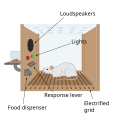Classical conditioning (also respondent conditioning and Pavlovian conditioning) is a behavioral procedure in which a biologically potent stimulus (e...
65 KB (8,707 words) - 14:36, 12 August 2024
Operant conditioning, also called instrumental conditioning, is a learning process where voluntary behaviors are modified by association with the addition...
67 KB (8,835 words) - 10:55, 10 September 2024
can be used to study both operant conditioning and classical conditioning. Skinner created the operant conditioning chamber as a variation of the puzzle...
16 KB (1,804 words) - 07:00, 30 August 2024
Eyeblink conditioning, classical conditioning involving pairing of a stimulus with an eyeblink-eliciting stimulus Fear conditioning, classical conditioning involving...
2 KB (320 words) - 14:46, 18 July 2024
Ivan Pavlov (section Classical conditioning)
experimental neurologist and physiologist known for his discovery of classical conditioning through his experiments with dogs. Pavlov was born the first of...
37 KB (4,105 words) - 18:43, 14 September 2024
associations is the basis for learning. This learning is seen in classical and operant conditioning.[citation needed] Edward Thorndike did research in this area...
18 KB (2,446 words) - 22:10, 23 May 2024
study that mid-20th century psychologists interpret as evidence of classical conditioning in humans. The study is also claimed to be an example of stimulus...
24 KB (2,919 words) - 01:59, 6 September 2024
Bedwetting alarm (section Classical conditioning)
This suggests that the conditioning treatment may follow the operant avoidance conditioning rather than the classical conditioning pattern. In addition...
12 KB (1,718 words) - 00:07, 14 July 2024
Learning (section Classical conditioning)
example, learning may occur as a result of habituation, or classical conditioning, operant conditioning or as a result of more complex activities such as play...
79 KB (9,913 words) - 12:15, 18 September 2024
Claustrophobia (section Classical conditioning)
many factors, including a reduction in the size of the amygdala, classical conditioning, or a genetic predisposition to fear small spaces. One study indicates...
28 KB (3,848 words) - 09:55, 17 September 2024





